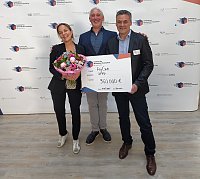
Medicinal Chemistry

AG Sippl 2022
Contact
Institut für Pharmazie
Institutsbereich Pharmazeutische Chemie und Klinische Pharmazie
Abteilung Medizinische Chemie
Leiter: Prof. Dr. Wolfgang Sippl
Kurt-Mothes-Straße 3
06120 Halle (Saale)
phone: +49-345-55-25040
fax: +49-345-55-27355
wolfgang.sippl@pharmazie.uni-halle.de
postal address:
Institut für Pharmazie
Institutsbereich Pharmazeutische Chemie und Klinische Pharmazie
Abteilung Medizinische Chemie
06120 Halle (Saale)
New publication on the development of CHK1 PROTACs in Angewandte Chemie
I am delighted to share our recent publication in Angewandte Chemie on the development and biological characterization of the first-in-class PROTAC for checkpoint kinase 1. It was a great collaboration with the Krämer group (Institute of Toxicology, University of Mainz) on another PROTAC that we developed together. Many thanks to all cooperation partners.
For the first time, we were able to develop a PROTAC molecule—MA203—that binds the target protein CHK1 to the cellular degradation machinery and initiates its proteasomal degradation. Unlike classic kinase inhibitors, which merely block enzymatic activities, MA203 eliminates the entire protein. This also disables the non-catalytic functions of CHK1, leading to increased apoptosis in tumor cells. In cell experiments, MA203 showed degradation of CHK1 in solid tumor and leukemia cells. The DNA replication stress triggered by chemotherapy further accelerates this process and enhances tumor cell apoptosis. It is noteworthy that MA203 leaves healthy hematopoietic cells, stromal cells, and retinal epithelial cells unaffected. In a direct comparison, MA203 proved to be superior to classic CHK1 kinase inhibitors currently in development – particularly with regard to the induction of DNA damage, apoptosis, and the regulation of DNA repair processes. The complete elimination of CHK1, not just its inhibition, triggers the degradation of key DNA replication and repair proteins. The study provides new insights into the non-catalytic functions of CHK1 and demonstrates the potential of PROTACs for the targeted elimination of important factors in tumor regulation.
Angewandte Chemie International Edition „Identification of a Proteolysis-Targeting Chimera that Addresses Activated Checkpoint Kinase-1 Reveals its Non-Catalytic Functions in Tumor Cells“.
Two new manuscripts on drug design published in Computers in Biology and Medicine
Open access:
Baselious F, Hilscher S, Handke L, Barinka C, Schutkowski M, Sippl W. In silico screening of a designed targeted chemical space identifies novel alkyl hydrazides as potent HDAC11 inhibitors. Comput Biol Med. 2025 Jul 4;196(Pt A):110695. doi:10.1016/j.compbiomed.2025.110695
Sarnow AC, Nassar H, Alfayomy AM, Robaa D, Sippl W. HADDOCK-Guided Modeling and Molecular Simulations of Cereblon-Based Ternary Complexes: Development of novel PROTACs for Ataxia telangiectasia and RAD3-Related (ATR) kinase. Comput Biol Med. 2025 Jun 13;194:110570. doi:10.1016/j.compbiomed.2025.110570
Research project in collaboration with Göttingen University Medical Center wins funding from IBT Lower Saxony
The Institute for Biomedical Translation (IBT), Lower Saxony, is funding a research project with nearly one million euros over two years. The project, which is being carried out by the University Medical Center Göttingen and the Department of Pharmacy at Martin Luther University Halle-Wittenberg, focuses on the development of novel therapeutic agents for the treatment of female-specific cancers. The project impressed with its idea at the fourth IBT Portfolio Conference, held on May 13, 2025, in Hanover.
Over the next two years, molecules will be developed at the Department of Pharmacy at MLU in collaboration with Prof. Dr. Julia Gallwas and Priv.-Doz. Dr. Florian Wegwitz (University of Goettingen) to enable targeted degradation of histone deacetylases 3 and 8 (HDAC3/8). These enzymes play a crucial role in tumor growth and the spread of cancer cells. The goal is to establish a startup specializing in the development of HDAC3/8-degrading molecules for the treatment of female-specific cancers. The research project will be funded with 960,000 euros.
The HyCan Project
Cancer represents a global health challenge, with 20 million new diagnoses and 10 million deaths worldwide each year. Female-specific cancers, such as endometrial, cervical, and ovarian cancers, significantly contribute to these high figures. Treatments for these cancers, including surgeries, chemotherapy, immunotherapy, and radiation therapy, can severely impact the quality of life of patients. The HyCan project ("Hydrophobic Tag Degraders of HDAC3/8 for the treatment of Solid Cancers") focuses on histone deacetylases as a target for a novel therapeutic approach. Preliminary research shows that the enzymes HDAC3 and HDAC8 are particularly suitable targets for new therapies because they are essential for cancer cell survival, while blocking them causes minimal damage to normal cells. The HyCan team uses an innovative hydrophobic tagging technology to mark HDAC3 and HDAC8 with a “hydrophobic tag,” prompting the cell to specifically degrade these enzymes. This weakens the cancer cells while largely sparing healthy cells. Additionally, this method makes it harder for the cancer cells to develop resistance, meaning the therapy retains its effectiveness over time. "By specifically degrading HDAC3/8, we can develop more targeted and less toxic treatment methods with significant medical benefits," says Prof. Dr. Wolfgang Sippl, Head of Medical Chemistry at the Department of Pharmacy, Martin Luther University Halle-Wittenberg.
For more information: www.ibt-ls.de

HyCan project wins at IBT.
New publication on FLT3-ITD PROTACs in Leukemia
Internal tandem duplications in FMS-like tyrosine kinase-3 (FLT3-ITD) are common mutations in acute myeloid leukemia (AML). In a DFG-funded project, we have now developed two different types of degraders for FLT-ITD and characterized them biologically in leukemia cells. Nanomolar doses of the degraders, a VHL-based PROTAC (MA49) and a degrader with a hydrophobic tag (MA50) induce apoptosis of human leukemic cell lines and primary AML blasts with FLT3-ITD, but not of primary hematopoietic stem cells and differentiated immune cells, FLT3 wild-type cells, retinal cells and c-KIT-dependent cells. The in vivo activity of MA49 against FLT3-ITD-positive leukemia cells was demonstrated in a zebrafish model.
In mechanistic studies, we investigated the effects of the two degraders on different downstram signals. The degrader-induced loss of FLT3-ITD involves the pro-apoptotic BH3-only protein BIM and a previously unidentified degrader-induced depletion of protein folding chaperones. The expression levels of HSP90 and HSP110 correlate with reduced survival of AML patients, and HSP90, HSP110 and BIM are associated with the expression of FLT3 in primary AML cells. HSP90 suppresses degrader-induced FLT3-ITD elimination, establishing a mechanistically defined feedback loop. The two compounds represent novel, potent tools to study the chemical knockout of FLT3-ITD.
First-in-class proteolysis targeting chimera for the Ataxia telangiectasia-and-RAD3-related kinase ATR
About three billion base pairs are replicated within each mammalian cell cycle. Chemotherapeutics kill tumor cells through the induction of DNA replication stress and DNA damage. Exogenous and endogenous DNA stress activate checkpoint kinases, which slow down the cell cycle and initiate DNA repair. The apical checkpoint kinase ataxia telangiectasia-and-RAD3-related (ATR) is activated by stalled DNA replication forks and single strand DNA breaks. Preclinical and clinical studies have demonstrated the efficacy of ATP-competitive ATR inhibitors in combination with chemotherapeutics. Proteolysis-targeting-chimeras (PROTACs) are modern agents that inhibit and eliminate their target proteins by the ubiquitin-proteasome system. We have now developed and characterized the first-in-class PROTAC for ATR in various cell systems. We demonstrate that the cereblon-targeting PROTAC Abd110 decreases ATR dependent on the E3 ubiquitin ligase cereblon and proteasomal activity. Abd110 synergistically induces apoptosis (programmed cell death) of acute myeloid and lymphatic leukemia cells when combined with the clinically used ribonucleotide reductase inhibitor hydroxyurea.
A. M. Alfayomy, R. Ashry, A. Kansy, A.C. Sarnow, F. Erdmann, M. Schmidt, O. H. Krämer, W. Sippl. Design, synthesis, and biological characterization of proteolysis targeting chimera (PROTACs) for the Ataxia telangiectasia and RAD3-related (ATR) kinase. Eur J Med Chem. 267:116167, 2024. doi:10.1016/j.ejmech.2024.116167 .
A. G. Kansy, R. Ashry, A. M. Mustafa, A. Alfayomy, M.P. Radsak, Y. Zeyn, M. Bros, W. Sippl and O. H. Krämer. Pharmacological degradation of ATR induces antiproliferative DNA replication stress in leukemic cells. Mol Oncol. 2024 Mar 22. doi:10.1002/1878-0261.13638.
New DFG Project: "Molecular Design, Synthesis, and Pharmacology of Targeted Protein Degraders for the Checkpoint Kinase ATR"
Kooperation: Prof. Dr. Oliver Krämer, Institut für Toxikologie, Johannes-Gutenbeg Universität Mainz
Preclinical cancer study: New therapeutic approach for the treatment of neuroblastoma in young children
Neuroblastome are tumors of the nervous system and are the leading cause of cancer-related deaths in young children. A research group at the Universitätsmedizin Halle has now uncovered the processes involved in the development of neuroblastoma for the first time. The protein IGF2BP1 is like a spark that can trigger a whole wildfire of cancer-promoting processes at the cellular level. In preclinical experiments, the researchers used a molecule that could block IGF2BP1 and nip the spark in the bud. During the development of the embryo, the protein IGF2BP1 ensures that cells can grow rapidly. If it occurs later, it is associated with tumors. "In short, IGF2BP1 ensures that another protein is produced more intensively. Both proteins can activate various, previously unexplained processes at the genetic level, which under these flawed circumstances have a strong cancer-promoting effect," explains Sven Hagemann, first author and biochemist at the Institute of Molecular Medicine at the University Medical Center Halle. In cooperation with the Institute of Pharmacy at the Martin-Luther-Universität Halle-Wittenberg , the team has successfully tested a molecule that could block IGF2BP1.
Hagemann S, Misiak D, Bell JL, Fuchs T, Lederer MI, Bley N, Hämmerle M, Ghazy E, Sippl W, Schulte JH, Hüttelmaier S. IGF2BP1 induces neuroblastoma via a druggable feedforward loop with MYCN promoting 17q oncogene expression. Mol Cancer. 2023 May 29;22(1):88. doi:10.1186/s12943-023-01792-0 .
New DFG project in research unit RU5433 RNA in focus
The German Research Foundation is funding a new research group at the Medical Faculty of Martin Luther University Halle-Wittenberg (MLU) with seven million euros. The research focuses on specific RNA molecules and proteins that are probably involved in the formation of tumors. The goal is to understand the underlying mechanisms and thus develop new treatment approaches.




